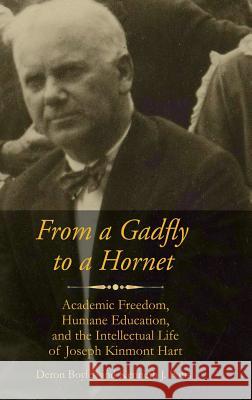From a Gadfly to a Hornet: Academic Freedom, Humane Education, and the Intellectual Life of Joseph Kinmont Hart(HC) » książka
From a Gadfly to a Hornet: Academic Freedom, Humane Education, and the Intellectual Life of Joseph Kinmont Hart(HC)
ISBN-13: 9781681234793 / Angielski / Twarda / 2016 / 256 str.
From a Gadfly to a Hornet: Academic Freedom, Humane Education, and the Intellectual Life of Joseph Kinmont Hart(HC)
ISBN-13: 9781681234793 / Angielski / Twarda / 2016 / 256 str.
(netto: 526,57 VAT: 5%)
Najniższa cena z 30 dni: 541,82 zł
ok. 13-18 dni roboczych.
Darmowa dostawa!
We examine Hart's peripatetic career as teacher, editor, journalist, lecturer, and public philosopher. It is biographical as well as an intellectual history of a fascinating character and prolific author. Our goal is to resurrect Hart's intellectual life in order to more deeply understand the significant isuues he not only confronted, but endured These issues primarily include academic freedom and humanizing education, with their direct links to community organizing and Danish folk schools-themes that run throughout the book. Instead of seeing Hart's intellectual life as a cautionary tale against forceful criticism, we offer a view consistent with Hart: we should embrace the "full and frank" sense of academic freedom in order to demonstrate a truly democratic mode of associated living in universities and civic communities. Respecting different views should not mean mollifying critique. The opposite, in fact, is in keeping with our view of the open exchange of ideas characteristic of free societies and legitimate institutions of higher education. Other theme of significance in this book include the status of the social foundations in teacher education, social welfare, pacifism, community organizing, the broader purpose of schools and universities in the U.S., and Hart's commitment to adult education via Danish folk schools and rural community living. The politics of teacher education are legion, and this was no less so when Hart began his career in the early twentieth century. Debates were had about the degree to which normal schools, as two?year teacher training sites, should broaden their technical scope to include the liberal arts. This is the distinction between teacher training and teacher education. Those in favor of classroom management and efficient controls or methods for dispensing curriculum faced criticism from those who thought schools should be embryotic spaces for individual and democratic growth. Hart was clearly on the side of individual and democratic growth and this meant, in part, less order, less routine, and less bureaucratic imposition of standards from bureaucratic hierarchies. Positively, it meant engaging in debates that challenge students to think differently than they have ever thought before. As we show in the following pages, Hart was enormously successful at challenging ideas...and many people would rather not be challenged. As we noticed above, this position results in demonstrating a "full and frank" enactment of academic freedom.











